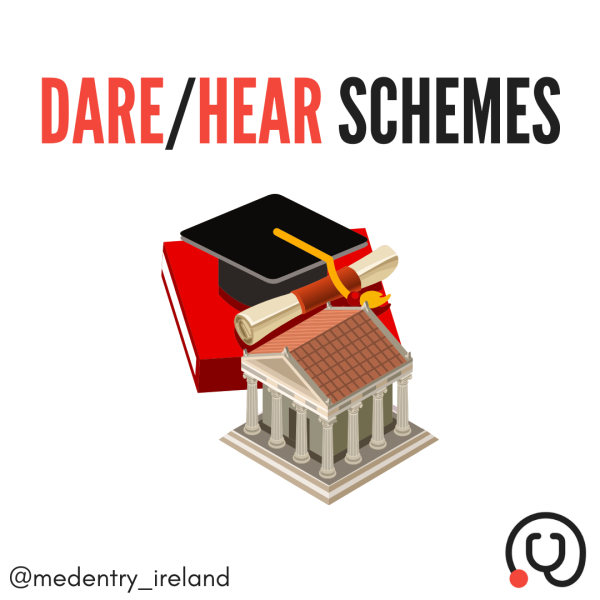Alternative Admissions Schemes for School Leavers: HEAR and DARE

1 year ago by Chris
Applying for a place in medicine is difficult enough for most students. If you have a disability or are from a low socioeconomic background, it can make the process even more challenging. For this reason, alternative admissions schemes are available which help students who might otherwise not have the opportunity to study. Examples of these third level alternative schemes are DARE (Disability Access Route to Education) and HEAR (Higher Education Access Route).
How do DARE and HEAR help?
Students who apply to DARE and/or HEAR and meet the application criteria may be offered a place in their preferred course, even if they do not achieve the required points. This is because the schemes offer students who meet the requirements reduced-points places.
Who is eligible to apply for DARE and HEAR?
DARE is a scheme for school-leavers whose disabilities have had a negative impact on their second level education. HEAR is a scheme for school-leavers, resident in the Republic of Ireland, who are underrepresented at Higher Education due to their socio-economic background.
DARE
To be eligible for DARE, students need to meet two criteria:
- Educational Impact Criteria – this looks at whether your disability has disrupted your school day, learning, exam results or has had other educational impacts
- Evidence of Disability – this may be physical, mental, neurological, developmental, ongoing, etc.
For both, students will need to submit the relevant documented evidence.
HEAR
To be eligible for HEAR students need to meet the income criteria plus a combination of two others:
- Income – family income falls below the HEAR Income Limit
- Medical/GP Visit Card – your family had a card at a certain time
- Means Tested Social Welfare – your family received this payment for a certain amount of time
- Socio-economic-group – your family belongs to either the Non-Manual Workers Group or the Semi and Unskilled Manual Workers Group
- DEIS School Attendance – you completed a certain number of years in a second level school that takes part in the DEIS
- Area profile – you live in an area where there is a concentrated disadvantage, e.g. high unemployment, poverty, etc.
Which colleges take part in DARE and HEAR?
In Ireland there are five medical schools that you can apply to as an undergraduate student:
- University College Dublin
- Trinity College Dublin
- Royal College of Surgeons in Ireland
- University College Cork
- University of Galway
All five colleges take part in DARE and HEAR schemes and have a limited number of reserved places to offer eligible applicants.
Can I apply to both DARE and HEAR?
Students can and should apply to both DARE and HEAR, if they meet the requirements of both the schemes. Students who are deemed eligible for both will be prioritised by the universities when offering their reduced points places.
How do I apply to DARE and HEAR?
To apply, you need to be under 23 years old as of 1 January 2025. When applications to the CAO open from November 2024 onwards you will need to make a CAO application.
For DARE you will need to fill in the online Supplementary Information Form (make sure to tick ‘Yes’ to question 1 showing that you wish to be considered for DARE), complete your Educational Impact Statement with your school and gather your Evidence of Disability documents. These documents must be posted, and must arrive by 15th March to the CAO – faxed or emailed documents will not be accepted.
For HEAR you will need to fill in the online HEAR application form on the CAO website at www.cao.ie by 1st March. Applications for DARE and HEAR will be assessed from April to June. Applicants will be notified of the results in late June.
In August, Leaving Certificate exam results are released and then eligible DARE / HEAR applicants are considered for the reduced points places, with offers made in late August.
For more information check out the CAO website under ‘Access Routes: DARE / HEAR’


